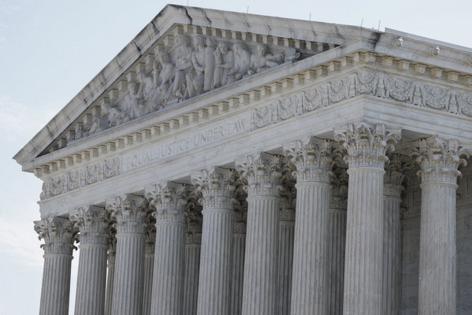US asks Supreme Court to allow halt on some foreign aid spending
Published in Political News
WASHINGTON — The Trump administration asked the Supreme Court on Monday to allow the government to not make about $4 billion in foreign aid payments, which the administration has told Congress it will unilaterally cancel under a 1974 budget law.
The U.S. asked the justices to temporarily halt a portion of a lower court ruling in a court challenge to the Trump administration’s freeze on foreign aid funds.
Last week, Judge Amir Ali of the U.S. District Court for the District of Columbia has mandated the administration pay $10.5 billion in foreign aid funds by Sept. 30, the end of the current fiscal year.
The government, in Monday’s application, said it had planned to obligate $6.5 billion of those funds by the deadline, but the other $4 billion is part of $4.9 billion in spending the administration wants to cancel in what’s known as a “pocket rescission.”
That is a legally untested budgetary tool intended to sidestep a law requiring congressional approval prior to canceling federal funding — and the DOJ says the lower court order impedes it.
The application ropes the justices into a high-profile struggle between the political branches amid the waning days of the fiscal year, as a shutdown looms and bipartisan members of Congress have cried foul over Trump’s broad claims of power to cancel congressionally mandated spending.
Under the law known as the Impoundment Control Act, if the president wants to terminate certain congressional appropriations, the White House can freeze disbursement of the funding for 45 days after sending Congress a notification of the proposed rescissions package.
The administration in Monday’s application called the lower court ruling a “grave and urgent threat to the separation of powers,” arguing the portion of the court ruling that covers the $4 billion undercut the administration’s use of the Impoundment Control Act and negotiations with foreign countries.
“The President can hardly speak with one voice in foreign affairs or in dealings with Congress when the district court is forcing the Executive Branch to advocate against its own objectives,” the application said.
The remaining $900 million in the administration’s rescission package “are contributions to the United Nations and affiliated organizations, which are not at issue,” the government wrote in the application.
The original challengers to the funding freeze filed their own opposition Monday, asking the Supreme Court to allow the lower court decisions to go into effect. The challengers also wrote that even any delay in the case could effectively allow the administration to impound billions of dollars by running out the clock.
Siding with the administration, despite a law on the books obligating it to spend the funds, “would fundamentally upend our constitutional structure,” the challengers wrote.
The impoundment law, passed in the wake of fights during the Nixon administration, allows a series of steps for the president to withhold funds and propose rescissions for Congress to pass. This summer the administration used the law successfully to propose a $9 billion rescission that passed Congress.
The court fight over the foreign aid funds has been brewing for months, since Trump first sought to freeze that spending in February. The Supreme Court has already weighed in once in March, directing Ali to clarify his order to pay what was at the time about $2 billion in frozen funds.
Ali eventually ruled in favor of the challengers, finding the administration had an obligation to pay the funds under the ICA. In August, a three-judge panel of the D.C. Circuit tossed that ruling, and the administration sent a $4.9 billion rescission request to Congress.
After getting the case back from the appeals court, last week Ali again ruled the administration must spend congressionally appropriated funds. Ali also said that the rescissions request may not allow the administration to get around the obligation to spend the money.
Ali and later a panel of the D.C. Circuit denied the Trump administration’s request to pause that ruling, prompting Monday’s application to the highest court.
The 45-day window for Congress to act under the law stretches past the end of the fiscal year, and administration officials have argued that would allow them to rescind the funding unilaterally if Congress does not vote.
The Government Accountability Office has said the strategy does not comply with the ICA. Democrats and Republicans have criticized the strategy, including Senate Appropriations Committee Chair Sen. Susan Collins, R-Maine. In a statement last month, Collins called it “unlawful” and said it undermined the law.
The case is Donald J. Trump, President of the United States et al. v. Global Health Council et al.
©2025 CQ-Roll Call, Inc., All Rights Reserved. Visit cqrollcall.com. Distributed by Tribune Content Agency, LLC.
























































Comments